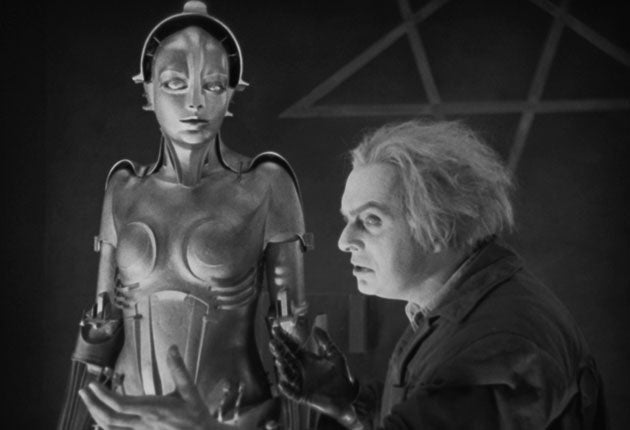Metropolis, Fritz Lang, 145 mins, (PG)
Back to the ravishing and dystopian future

Your support helps us to tell the story
From reproductive rights to climate change to Big Tech, The Independent is on the ground when the story is developing. Whether it's investigating the financials of Elon Musk's pro-Trump PAC or producing our latest documentary, 'The A Word', which shines a light on the American women fighting for reproductive rights, we know how important it is to parse out the facts from the messaging.
At such a critical moment in US history, we need reporters on the ground. Your donation allows us to keep sending journalists to speak to both sides of the story.
The Independent is trusted by Americans across the entire political spectrum. And unlike many other quality news outlets, we choose not to lock Americans out of our reporting and analysis with paywalls. We believe quality journalism should be available to everyone, paid for by those who can afford it.
Your support makes all the difference.Is Fritz Lang's 1927 epic Metropolis the most influential film ever? It certainly spawned the cinema of futurism, and watching it today – now in an important new restoration – it's uncanny to see how many shadows of cinema yet to come it already contains. Things to Come, Blade Runner, Alphaville and The Matrix are all there in embryonic state. Metropolis has also been a major influence in pop, with Kraftwerk and Madonna overtly rifling its imagery and oddball soulster Janelle Monáe even now kitting up in Langian robo-chic.
But pop admirers haven't always been kind to Lang's vision. In the 1980s, disco producer Giorgio Moroder supervised a colourised, abridged restoration set to music by Pat Benatar and Billy Idol. That version would feel downright archaic compared with the vitality of the Metropolis released last week, which is the closest we've yet seen to Lang's original vision. Originally, the film was substantially cut by its producers, resulting in plot incoherences that have endured till now. Thanks to lost footage discovered in Argentina, the film has been expanded by some 25 minutes, and the result is dazzling, even if some images remain unfixably damaged.
Set in a dystopian city of the future (or allegorical present), the story recounts a battle between Metropolis's overlord Joh Fredersen (Alfred Abel) and an inventor, Rotwang (Rudolf Klein-Rogge), who wears a prototype of the Dr Strangelove mad hand. Rotwang engineers urban apocalypse by having his robot impersonate social activist Maria (Brigitte Helm). The anti-Maria foments unrest among the city's oppressed workers, while driving the city's wealthy sons to lustful violence with her astonishingly lubricious nightclub dancing.
The new material brings several new aspects to Metropolis. There's now a reason why Fredersen and Rotwang are at odds: the inventor resents Fredersen marrying his now-dead beloved Hel. The climactic scenes in which Fredersen's son Freder (Gustav Frölich) saves crowds of children from floods have a rousing blockbuster intensity, setting a template for the disaster movie. And a major figure emerges in Fredersen's spymaster, the Zorro-hatted "Thin Man" (Fritz Rasp): his presence not only highlights the surveillance obsession that ran through Lang's work, but also offers an uncanny portent of later screen depictions of Gestapo agents.
The film's futurism is still breathtaking, from its Art Deco titles to the neon spiral in Rotwang's lab: this is surely must the first film to imagine people communicating by video screen. And Rotwang's creation is not the first film robot, but it was the first to be sexy and streamlined. Resembling C3PO's chic sister, the robot transmutes into even stranger human form, played by Helm with mad, drunken eyes.
Certain oddities emerge in this new version. Why does Metropolis have no police force or army? What is the city's relationship to the outside world? And why does this hyper-modern city still contain Gothic cathedrals? But the main thing is that the film totally comes alive again, very nearly in a complete reconstruction of the original. Gottfried Huppertz's 1920s orchestral score is here too, much of it sounding uncannily like John Williams. More than an average restoration, Metropolis is one of the best new films of the year – and all the better without Billy Idol.
Join our commenting forum
Join thought-provoking conversations, follow other Independent readers and see their replies
Comments